| Listing 1 - 10 of 19 | << page >> |
Sort by
|
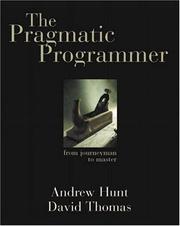
ISBN: 9780201616224 020161622X Year: 1999 Publisher: Boston (Mass.) Addison-Wesley Professional
Abstract | Keywords | Export | Availability | Bookmark
 Loading...
Loading...Choose an application
- Reference Manager
- EndNote
- RefWorks (Direct export to RefWorks)
Computer programming --- Computer programming. --- Computers --- programmeren. --- Programming --- programmeren (informatica) --- programmeren --- 681.3*D1 --- 681.3*D1 Programming techniques--See also {681.3*E} --- Programming techniques--See also {681.3*E} --- Programmeren --- Kind
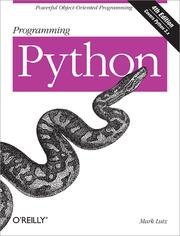
ISBN: 9780596158101 0596158106 Year: 2011 Publisher: Sebastopol, CA : O'Reilly,
Abstract | Keywords | Export | Availability | Bookmark
 Loading...
Loading...Choose an application
- Reference Manager
- EndNote
- RefWorks (Direct export to RefWorks)
Provides information and tutorials on Python's application domains and its use in databases, networking, scripting layers, and text processing.
Python (Computer program language) --- Python (langage de programmation) --- Python (Computer program language). --- Computer. --- Programmeren. --- Software.
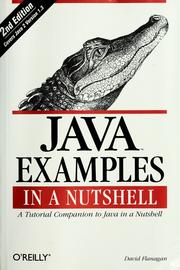
ISBN: 0596000391 0596001126 Year: 2000 Publisher: Beijing O'Reilly
Abstract | Keywords | Export | Availability | Bookmark
 Loading...
Loading...Choose an application
- Reference Manager
- EndNote
- RefWorks (Direct export to RefWorks)
1.Java basics 2.Objects, classes, and interfaces 3.Input/output 4.Threads 5.Networking 6.Security and cryptography 7.Internationalization 8.Reflection 9.Object serialization 10.Graphical user interfaces 11.Graphics 12.Printing 13.Data transfer 14.JavaBeans 15.Applets 16.Remote method invocation 17.Database access with SQL 18.Servlets and JSP 19.XML 20.Example index
Programming --- 681.3 --- 654 --- AA / International- internationaal --- 004.432 --- Java (programmeertaal) --- programmeren --- Computerwetenschap --- Informatieverwerking. Bureautica. --- programmeertalen --- Java (programmeertaal). --- 681.3* / / / / / / / / / / / / / / / / / / / / / / / / / / / / --- Informatieverwerking. Bureautica
Book
ISBN: 9789077442814 Year: 2007 Publisher: Leuven : LannooCampus,
Abstract | Keywords | Export | Availability | Bookmark
 Loading...
Loading...Choose an application
- Reference Manager
- EndNote
- RefWorks (Direct export to RefWorks)
ASP.NET in het nieuwe 2.0 Framework verbreedt de horizon van iedere programmeur die betrokken is bij de ontwikkeling van interactieve webapplicaties. Dit handboek behandelt ASP.NET 2.0 en is bedoeld voor zowel beginnende als professionele programmeurs. Het boek doorloopt alle stappen van het proces dat nodig is om een volledige webapplicatie te ontwikkelen. Ook leer je hoe je bij het ontwikkelen van ASP.NET webapplicaties rekening houdt met de client server architectuur. Handboek ASP.NET 2.0 gaat uitgebreid in op volgende aspecten: - Essentië le vaardigheden als het doorgeven van data aan de hand van querystring parameters en het gebruik van cookies. Dit wordt behandeld samen met het nieuwe cross page posting model. - Het gedrag van en het onderscheid tussen de verschillende types controls. Daarnaast zie je hoe je bestaande functionaliteiten kunt uitbreiden met eigen componenten, of hoe je eigen componenten volledig nieuw kunt ontwikkelen. - Vanuit het belang van data wordt ook ADO.NET behandeld, zowel het connected als disconnected model. Hierbij biedt Visual Studio meerdere mogelijkheden om data te koppelen aan gegevensbronnen. - Configuratiefiles met nadruk op de beveiliging aan de hand van de verschillende settings. - De nieuwe mogelijkheden van ASP.NET zoals master pages, sitemaps, menu controls, login controls en themes. Bij alle onderwerpen wordt de theorie toegelicht met voorbeelden in zowel VB.NET als C# . De bouw van een webwinkel, uitgewerkt over de hoofdstukken, is gekozen om te laten zien hoe de verschillende technieken samenwerken. De nadruk in Handboek ASP.NET 2.0 ligt niet op wijze waarop je een webapplicatie bij elkaar klikt in Visual Studio. Het gaat om het begrijpen van en leren werken met de verschillende functionaliteiten, zodat je een stevige basis hebt om praktijkgerichte oplossingen te realiseren. 2.0 Framework van ASP.NET biedt zonder meer een nieuwe horizon voor iedere programmeur die zich bezighoudt met het ontwikkelen van allerlei int
ASP.NET 2.0 --- ASP.NET 2.0. --- Programming --- programmeren (informatica) --- VB (Visual Basic) --- webapplicaties (informatica) --- ASP.NET --- AA / International- internationaal --- 654 --- Programming languages --- Informatieverwerking. Bureautica. --- Informatieverwerking. Bureautica
Book
ISBN: 9781492072942 Year: 2020 Publisher: Sebastopol O'Reilly Media
Abstract | Keywords | Export | Availability | Bookmark
 Loading...
Loading...Choose an application
- Reference Manager
- EndNote
- RefWorks (Direct export to RefWorks)
Statistical methods are a key part of of data science, yet very few data scientists have any formal statistics training. Courses and books on basic statistics rarely cover the topic from a data science perspective. This practical guide explains how to apply various statistical methods to data science, tells you how to avoid their misuse, and gives you advice on what's important and what's not. Many data science resources incorporate statistical methods but lack a deeper statistical perspective. If you’re familiar with the R programming language, and have some exposure to statistics, this quick reference bridges the gap in an accessible, readable format.
Mathematical analysis --- Analyse mathématique --- Quantitative research --- Big data --- Statistical methods. --- Méthodes statistiques. --- Mathematics. --- Python --- R --- Programmeren --- Programmeertaal --- Statistiek --- Python (programmeertaal) --- R (programmeertaal) --- Analyse mathématique --- Méthodes statistiques.
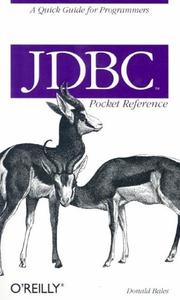
ISBN: 0596004575 Year: 2003 Publisher: Sebastopol O'Reilly
Abstract | Keywords | Export | Availability | Bookmark
 Loading...
Loading...Choose an application
- Reference Manager
- EndNote
- RefWorks (Direct export to RefWorks)
Samenvatting:The JDBC Pocket Reference offers quick look-ups for all methods of thestandard JDBC classes. These include concise reviews of the proceduresfor common JDBC tasks such as connecting to a database, executing storedprocedures, executing DDL and the like. You'll find documentation of theconnect string formats for the most common databases, including Oracle,SQL-Server, and PostgreSQL. You'll even find information on working withlarge objects, and on using SQL99 user defined datatypes to work withobject-relational data. Searching for this sort of material through largetutorials is frustrating and a waste of time, but this pocket-sized bookis easy to take anywhere and makes finding the information you need asnap
Gegevensbanken --- Java (programmeertaal) --- Programmeren --- AA / International- internationaal --- 654 --- JDBC --- Java --- Programmeertalen: Java --- Informatieverwerking. Bureautica. --- Gegevensbanken. --- Java (programmeertaal). --- Programmeren. --- Application program interfaces (Computer software) --- Database management --- Java (Computer program language) --- Object-oriented programming languages --- JavaSpaces technology --- APIs (Computer software) --- Interfaces, Application program (Computer software) --- Application software --- Computer programs --- Informatieverwerking. Bureautica
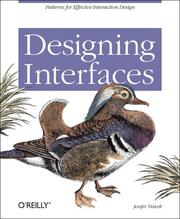
ISBN: 9780596008031 Year: 2005 Publisher: Sebastopol O'Reilly
Abstract | Keywords | Export | Availability | Bookmark
 Loading...
Loading...Choose an application
- Reference Manager
- EndNote
- RefWorks (Direct export to RefWorks)
654 --- AA / International- internationaal --- 528.52 --- interfaces --- Informatieverwerking. Bureautica. --- informatica-data-,telecommunicatie, internet, ontw., programmeren, beheren van internetsites --- Programming --- Informatieverwerking. Bureautica --- departement Beeldende Kunst 09 --- webdesign --- 770.7 --- user interfaces --- human-computer interaction --- computers --- computerprogramma's --- software --- interaction design --- interactief design --- interaction design, participatory design, social design --- internet - ontwerpen, programmeren en beheren van internetsites --- #SBIB:309H1720 --- Informatiekunde, informatie management
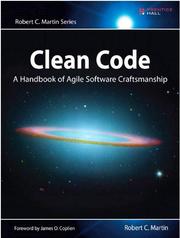
ISBN: 0132350882 9780132350884 Year: 2007 Publisher: United Kingdom Prentice Hall
Abstract | Keywords | Export | Availability | Bookmark
 Loading...
Loading...Choose an application
- Reference Manager
- EndNote
- RefWorks (Direct export to RefWorks)
Noted software expert Robert C. Martin presents a revolutionary paradigm with Clean Code: A Handbook of Agile Software Craftsmanship. Martin has teamed up with his colleagues from Object Mentor to distill their best agile practice of cleaning code “on the fly” into a book that will instill within you the values of a software craftsman and make you a better programmer―but only if you work at it. What kind of work will you be doing? You'll be reading code―lots of code. And you will be challenged to think about what's right about that code, and what's wrong with it. More importantly, you will be challenged to reassess your professional values and your commitment to your craft. Clean Code is divided into three parts. The first describes the principles, patterns, and practices of writing clean code. The second part consists of several case studies of increasing complexity. Each case study is an exercise in cleaning up code―of transforming a code base that has some problems into one that is sound and efficient. The third part is the payoff: a single chapter containing a list of heuristics and “smells” gathered while creating the case studies. The result is a knowledge base that describes the way we think when we write, read, and clean code. Readers will come away from this book understanding1) How to tell the difference between good and bad code, 2) How to write good code and how to transform bad code into good code, 3) How to create good names, good functions, good objects, and good classes, 4) How to format code for maximum readability, 5) How to implement complete error handling without obscuring code logic & 6) How to unit test and practice test-driven development. This book is a must for any developer, software engineer, project manager, team lead, or systems analyst with an interest in producing better code.
Agile software development --- Computer software --- betrouwbaarheid --- programmeren --- software --- 681.3*D2 --- Agile development (Computer science) --- Agile methods (Computer science) --- Agile processes (Computer science) --- 681.3*D2 Software engineering: protection mechanisms; standards--See also {681.3*K63}; {681.3*K51} --- Software engineering: protection mechanisms; standards--See also {681.3*K63}; {681.3*K51} --- Development --- Reliability --- Agile software development. --- Agile software. --- Computersoftware. --- Softwareontwikkeling. --- Reliability. --- Programming --- PXL-Research 2019 --- informatica --- software engineering --- Programmeren --- Computer software ; Betrouwbaarheid. --- Computer software ; Reliability. --- Informatica ; Programmeren. --- Software engineering. --- Software ontwikkeling. --- Kind --- Computer software - Reliability
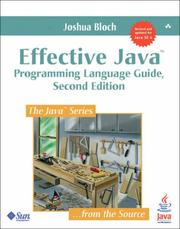
ISBN: 9780321356680 0321356683 Year: 2008 Publisher: Upper Saddle River, NJ : Addison-Wesley,
Abstract | Keywords | Export | Availability | Bookmark
 Loading...
Loading...Choose an application
- Reference Manager
- EndNote
- RefWorks (Direct export to RefWorks)
Programming --- programmeren (informatica) --- Java (informatica) --- Java (Computer program language) --- Java (Langage de programmation) --- AA / International- internationaal --- 654 --- 005.133 --- Object-oriented programming languages --- JavaSpaces technology --- Informatieverwerking. Bureautica. --- Java (Computer program language). --- Informatieverwerking. Bureautica
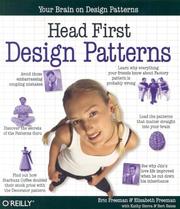
ISBN: 9780596007126 0596007124 Year: 2014 Publisher: California O'Reilly Media
Abstract | Keywords | Export | Availability | Bookmark
 Loading...
Loading...Choose an application
- Reference Manager
- EndNote
- RefWorks (Direct export to RefWorks)
1 Welcome to design patterns : an introduction 2 Keeping your objects in the know : the observer pattern 3 Decorating objects : the decorator pattern 4 Baking with OO goodness : the factory pattern 5 One of a kind objects : the Singleton pattern 6 Encapsulating invocation : the command pattern 7 Being adaptive : the adapter and facade patterns 8 Encapsulating algorithms : the template method pattern 9 Well-managed collections : the iterator and composite patterns 10 The state of things : the state pattern 11 Controlling object access : the proxy pattern 12 Patterns of patterns : compound patterns 13 Patterns in the real world : better living with patterns 14 App. : leftover patterns
Computer software --- Java (Computer program language) --- Development. --- Development --- Ontwerpmethodologie. --- Programmeermethoden. --- Programming --- Artificial intelligence. Robotics. Simulation. Graphics --- vormgeving --- java --- 681.3.06 --- Java --- Softwareontwikkeling --- Systeemanalyse (Systeemontwerp) --- softwareontwikkeling --- 681.3 --- Software-ontwerp --- Ontwerppatronen --- 654 --- AA / International- internationaal --- Development of computer software --- Software development --- Object-oriented programming languages --- JavaSpaces technology --- Informatieverwerking. Bureautica --- Logiciels --- Java (Langage de programmation) --- Développement --- Programmering --- Artificiële intelligentie. Robotica. Simulatie. Graphics --- Design Patterns --- Programmeren --- PXL-IT 2019 --- PXL-Handboeken --- programmeren --- designconcept --- Informatica --- Softwarepakketten --- Systeemontwikkeling --- Softwareontwikkelmethode --- Kind --- Computer software - Development. --- Computer software - Development
| Listing 1 - 10 of 19 | << page >> |
Sort by
|

 Search
Search Feedback
Feedback About
About Help
Help News
News